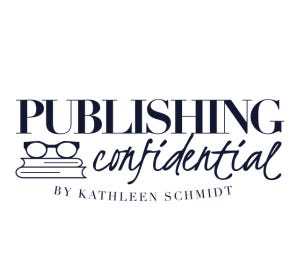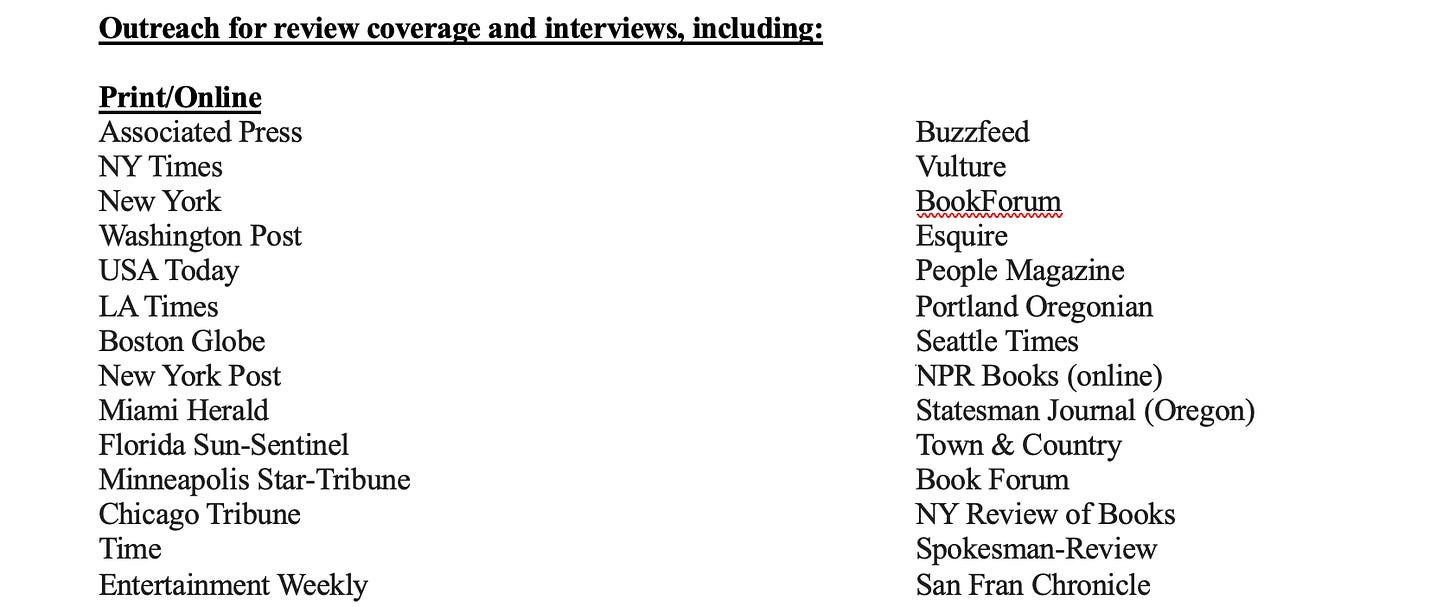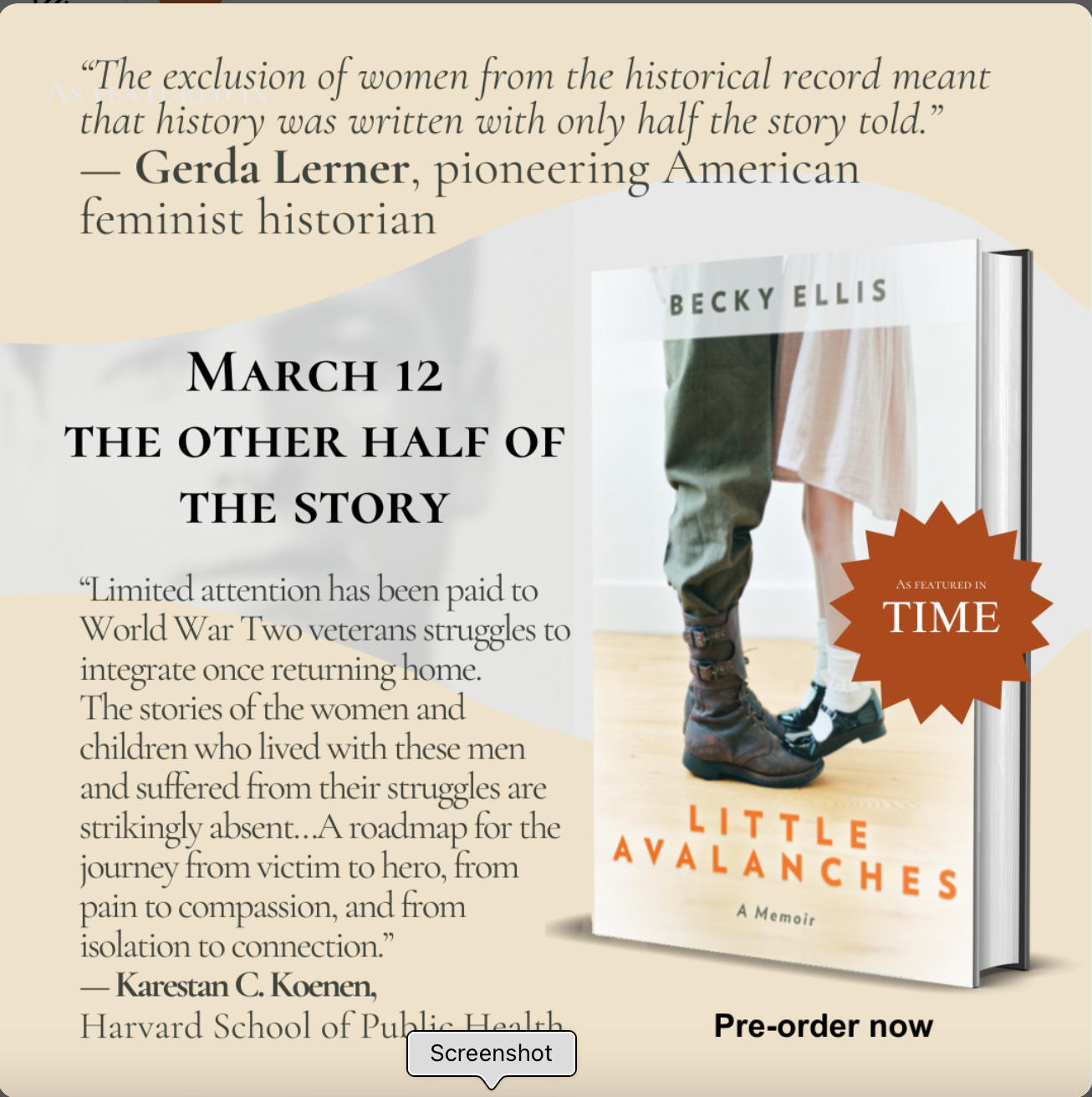EDITED: Book Sales vs. Publicity
If publicity doesn't equate to book sales, it's a problem. Here's how to think about publicity and sales.
Author’s Note: It has come to my attention that the newsletter had a glitch when I initially sent it. It should be fine now. My apologies for clogging your inbox. There has been a tech issue with the past couple of newsletters and I am working on it.
Hello!
I don’t know about you, but I am happy to close the door on January. It’s been a long, cold, grey month here in New Jersey. Brighter days are ahead. We’ve got this.
Today, I am writing about book sales and publicity because the two things often don’t align and are worth discussing. I initially wanted to put this behind a paywall, but I’d like free subscribers to get a taste of the content paid subscribers receive. Ready? Here we go:
I. Strategy Matters
Whether you are presented with marketing and publicity plans from your publisher or a proposal from a freelance publicist, you must be aware of the strategy behind them. Let’s look at an example of a proposal of mine. Please keep in mind that this is a sample and not an entire proposal:
As you can see, there are some heavy-hitter media outlets listed. The strategy behind pitching them is to secure reviews and interviews for an author. We want to think that reviews in any of these places would sell an impressive number of books. The truth is, they don’t. So, then, what is the point? Book reviews are SO HARD to get, and they don’t help sell books. They help an author’s profile, possibly provide blurbs for marketing purposes, and give writers validation. Do they equate to meaningful sales? No.
There are two kinds of publicists: one is a pitching machine, where they focus on media hits and not strategy. The other is my style: being strategic in what promotional activities occur and drawing a direct line to sales from them. The publicist who cares about your writing career before and after the current book is the one who will help you. That is why I prefer the moniker “strategist.”
II. Marketing & Publicity Still Matters
I have a personal rule: I have to hear about a book three times within a short time frame before I will buy it. I say this not as a book publicist but as a consumer. Other consumers are similar, which is why there is an economy of influencers on social media. Publishers must still market and publicize their books; the way they do it needs to change, but so does the overall thought process within the industry.
An antiquated assumption is that a New York Times review will sell many books. A modern way of thinking is that a good New York Times review will provide marketing copy and give the author more name recognition. Agents, editors, retail accounts, and sales departments must reframe their metrics to define a successful publication. It is not a title that gets rave reviews from major media and sells many copies. Instead, it builds an author’s career profile to better connect with readers. The connection with readers (a.k.a. every publisher’s customers) sells books. This can happen with or without media hits.
Think of it this way: If an author receives robust media coverage but their book sales are weak, it is a red flag to publishers. If an author doesn’t have the media hits but connects with readers and creates a solid fan community, they will sell books, and publishers will take notice. Interestingly, I’ve seen more cases of the latter during my career. My point is that promotional activities still need to happen for readers to take notice of authors.
III. Why You Should Care About Strategy and Sales
Imagine this: You are an author about to publish your second book of a two-book deal with a Big Five publisher. The first book had mediocre sales, and you are writing your third book, for which your publisher has the first option (this means they get to look at the manuscript first and have the first right of refusal). If your second book doesn’t sell well, the publisher will unlikely pick up the option for the third. Further, another Big Five publisher will unlikely buy your third book…even if there was decent publicity.
Similarly, if your first book is published to excellent reviews but doesn’t sell, it will be that much harder to get your second book published. If your current publisher holds the first option, they may skip your next book.
I am not writing this to discourage you. Instead, it is a truthful look at what can happen if your promotional strategy doesn’t include connecting directly with readers. In a future paid edition of this newsletter, I will write about how granular you must get when identifying your ideal readers.
IV. Retaining and Growing Your Audience
While publicity can help elevate your profile, it’s important to cultivate your audience. Think of them like a garden: they need to be tended to. Additionally, you must grow your audience between writing books, or sales will not follow. Notice I didn’t say “grow your platform.” I framed it as growing your audience because those readers don’t only exist on social media. I can’t tell you who your specific audience is because it depends on your book, your work outside of writing books, and other factors (hint: these are things I discuss in paid editons!).
The worst thing you can do as a writer is take a page from the movie “Field of Dreams” and think they will come if you build it. You not only have to give them a reason to visit your books; you have to give them a reason to stay. Writing is a solitary gig, but you can’t simply hand the keys over to a marketer and publicist and let them drive a campaign without you participating.
V. Knowing Your Audience=Knowing How to Sell Your Book
One reason I love doing consultations with authors is that I can help them refine their book pitches. Writing a succinct pitch is second nature when you’ve been in the publicity world as long as I have. I don’t expect authors to have their elevator pitches perfected, but that doesn’t mean they don’t need one. Knowing your audience makes it easier to market and sell your book to them. It is also easier to craft a pitch. An early lesson I learned in my career was that you had to know who was on the receiving end of your pitch. Meaning: Cultivate your relationships, gain their trust, and you will connect with them. It is no different for authors.
I hope this edition of Publishing Confidential gave you some food for thought and an idea of what the paid edition is like (though I go into more detail with those posts).
Suggestions: publishingconfidential@gmail.com
Biz/interview inquiries: kathleen@kmspr.com
END NOTES:
What I’m Reading: This is a gorgeous book.
What I’m Watching: Way too many TikToks and IG Reels of Pookie and Jett. Join me on this journey, won’t you?
What I’m Listening To: I am very into David Kushner. If you like Hozier, you will like him. Warning: His music is not cheery. It’s brooding music.
What I’m Buying: This PELICAN. I had to.






I think you're on to something that many of my fellow authors don't understand - the "sales funnel" only starts with awareness (your version of seeing a book 3 times in quick succession, including social media posts, cover reveals, podcast interview, guest blogs) - then it moves to legitimacy (the realm of blurbs and media and/or lay reviews) and finally to a call to action (a giveaway, an author talk that impresses, affinity to the subject matter, loyalty to the author because you've liked their other books, price cuts, genre interest, etc). Concentrating only on the first step is not enough.
That pelican!!! Must have 😂
Also thanks as always for this!